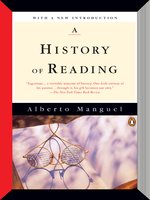From the book
ACKNOWLEDGEMENTS
INTRODUCTION
The fate of every book is mysterious, especially to its author. After the first publication of A History of Reading in 1996, I was astonished to discover a worldwide community of readers who, individually and under circumstances very different from my own, had undertaken the same adventures and shared with me identical rituals of initiation, epiphanies and persecutions, as well as the intuition that book and world are reflections of each other.
Reading has always been for me a sort of practical cartography. Like other readers, I have an absolute trust in the capability that reading has to map my world. I know that on a page somewhere on my shelves, staring down at me now, is the question I’m struggling with today, put into words long ago, perhaps, by someone who could not have known of my existence. The relationship between a reader and a book is one that eliminates the barriers of time and space and allows for what Francisco de Quevedo, in the sixteenth century, called “conversations with the dead”. In those conversations I’m revealed. They shape me and lend me a certain magical power.
Only a few centuries after the invention of writing, some six thousand years ago, in a forgotten corner of Mesopotamia (as the following pages will tell), the few who possessed the ability to decipher written words were known as scribes, not as readers. Perhaps the reason for this was to lend less emphasis to the greatest of their gifts: having access to the archives of human memory and rescuing from the past the voice of our experience. Since those distant beginnings, the power of readers has produced in their societies all manner of fears: for having the craft of bringing back to life a message from the past, for creating secret spaces which no one else can enter while the reading takes place, for being able to redefine the universe and rebel against unfairness, all by means of a certain page. Of these miracles we are capable, we the readers, and these may perhaps help rescue us from the abjection and stupidity to which we seem so often condemned.
And yet, banality is tempting. To dissuade us from reading, we invent strategies of distraction that transform us into bulimic consumers for whom novelty and not memory is essential. We reward triviality and monetary ambition while stripping the intellectual act of its prestige, we replace ethical and aesthetic notions with purely financial values and we propose entertainments that offer immediate gratification and the illusion of universal chatting instead of the pleasurable challenge and amiable slow pace of reading. We oppose the printing press to the electronic screen, and we substitute libraries of paper, rooted in time and space, with almost infinite webs whose most notorious qualities are instantaneity and immoderation.
Such oppositions are not new. Towards the end of the fifteenth century, in Paris, high up in the tall bell towers where Quasimodo hides, in a monk’s cell that serves both as study and alchemist’s laboratory, the archdeacon Claude Frollo stretches one hand towards the printed volume on his desk, and with the other points towards the Gothic contours of Notre Dame which he can see below him, through his window. “This,” says the unhappy clergyman, “will kill that.” According to Frollo, a contemporary of Gutenberg, the printed book will destroy the book-edifice; the printing press will put an end to the literate medieval architecture in which every column, every architrave, every portal is a text that can and must be read.
Then, as...




